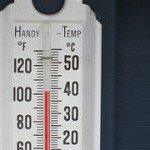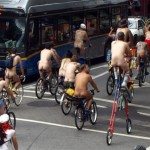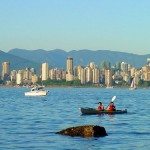What Vancouver can learn from Trump supporters
Yawning class divide could be a cautionary tale of two cities
In the summer of 1987 I flew to Calgary to attend the wedding of my cousin, where I was one among hundreds of invited guests. During the banquet I was seated beside an older woman, barely five feet tall, who had the thick accent of a Brooklyn native.
It turns out she was Helen Hart, mother of the famous Canadian pro wrestler Bret “the Hitman” Hart, and wife of Stu.
Whether it was our seating at the back of the banquet hall, or the flowing wine, Helen and I in our hour or so together hit it off. I recall her telling me the story of how Stu, a strapping kid from Alberta who as a wrestler on the professional circuit of the 1940s and ’50s, courted her away from her home town for a life in Canada in spite of the protests of her family members.
As we ended our time together, she tapped me on my arm and leaned over to say, “You should go to New Yawk. It’s your kinda town.”
Helen Hart passed away in 2001. I am almost embarrassed to admit it took me 30 years to take her suggestion to visit New York City.
The excuse I used for finally going was being accepted as a delegate at the Cities for Tomorrow conference hosted by the New York Times publishing group. It was a day-long series of presentations discussing the political and social challenges and opportunities facing our urban centres.
There was a small Canadian contingent, including myself and a pair of our region’s mayors.
The conference opened with an evening screening of a new documentary on the battle waged by famed urbanist Jane Jacobs to preserve traditional neighbourhoods against the will of Robert Moses, the powerful bureaucrat who spearheaded New York’s urban renewal for decades.
Though the documentary was a one-sided affair and a very unflattering look at Moses himself, it provided a window on how activism and the institutions that run our cities collide. It also exposed how tone deaf our political class can be when it comes to the will of the public — a theme of the conference itself.
From the politicians, journalists, authors, philanthropists, social workers and entrepreneurs presenting at Cities for Tomorrow, the chasm between haves and have-nots — American workers and the elites — was a recurring subject. The ultimate expression of this undoubtedly represented by the election of Donald J. Trump, and the base of voters standing resolutely behind him.
According to University of California law professor and author Joan C. Williams — who spoke at the conference — this yawning class divide is driving American politics, and creating a widening gulf between the top 20 per cent of American households and those in the middle class.
Conference delegates were handed complimentary copies of Williams’ latest book, White Working Class: Overcoming Class Cluelessness in America. Getting to understand the current political predicament facing the U.S. and finding ways to bridge the gap is something the author believes is critical to our society.
I think that while the political lines are not yet as sharply drawn in British Columbia as in the United States, that “disconnect” between the political class and everyday voters was evident in the recent B.C. election. It may also show itself in the 2018 municipal elections across the province.
In addition to this food for thought, I must share how incredibly impressed I was by New York City. For a fan of cities like me there can be no richer feast.
The walkability of the city expressed in the High Line, the Brooklyn Bridge, Rockefeller Plaza, Times Square and Central Park (where I managed to get in an early morning 10k run), as well as other beautiful, well-used parks such as at Union Square in the Flatiron district, are urbanism at its best.
I also was pleased at the continuing efforts to pick up litter downtown, something Vancouver could really learn from.
So to dear Helen Hart: thank you for your wonderful recommendation. You were absolutely correct in that “New Yawk” is a place I cannot wait to revisit.
+++
Originally published in Vancouver Courier















